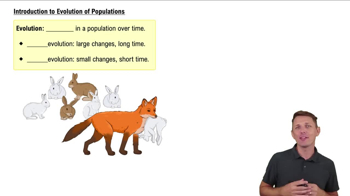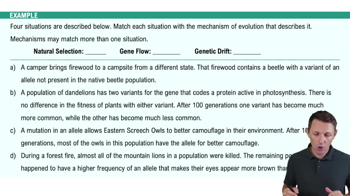Evolution of Populations exam Flashcards
 Back
BackEvolution of Populations exam
1/29
Terms in this set (29)
- MacroevolutionLarge-scale evolutionary changes that occur over long periods of time.
- What is microevolution?Small, rapid evolutionary changes within a population.
- Natural SelectionA mechanism of evolution where certain alleles enhance reproductive success.
- What is genetic drift?Random changes in allele frequency within a population.
- Gene FlowMovement of alleles between populations.
- What is the modern synthesis?Integration of Darwinian evolution and Mendelian genetics.
- Population GeneticsStudy of processes that affect genes at the population level.
- What is an allele?A variant form of a gene.
- MutationA change in DNA that introduces new alleles into a population.
- What does natural selection depend on?The reproductive success of certain alleles.
- Genetic VariationDiversity in gene frequencies within a population.
- What is the focus of microevolution?Small changes in allele frequencies over short periods.
- How does gene flow affect populations?It changes allele frequencies by introducing new alleles.
- What is the significance of the modern synthesis?It combined Darwin's and Mendel's theories to explain evolutionary processes.
- What is the role of mutation in evolution?It introduces new genetic variations into a population.
- How does genetic drift differ from natural selection?Genetic drift is random, while natural selection is based on reproductive success.
- What is the importance of genetic variation?It is crucial for the process of evolution.
- What is the outcome of gene flow?It can lead to changes in allele frequencies in a population.
- How do new alleles become common in a population?Through mechanisms like natural selection, genetic drift, and gene flow.
- What is the primary focus of population genetics?Understanding how genes and alleles change within populations.
- What is the relationship between survival and reproduction in natural selection?Survival increases the chance of reproduction, passing on advantageous alleles.
- How does genetic drift occur?Through random events that affect allele frequencies.
- What is the significance of allele frequency in evolution?Changes in allele frequency indicate evolutionary changes in a population.
- What is the role of natural selection in evolution?It increases the frequency of beneficial alleles in a population.
- How does mutation contribute to genetic variation?By introducing new alleles into the gene pool.
- What is the effect of gene flow on genetic diversity?It can increase genetic diversity by introducing new alleles.
- What is the main difference between macroevolution and microevolution?Macroevolution involves large changes over long periods, while microevolution involves small changes over short periods.
- How do evolutionary mechanisms affect allele frequencies?They can increase or decrease the frequency of specific alleles in a population.
- What is the significance of the early 1900s in evolutionary biology?The modern synthesis, combining Darwinian evolution and Mendelian genetics, was developed.

